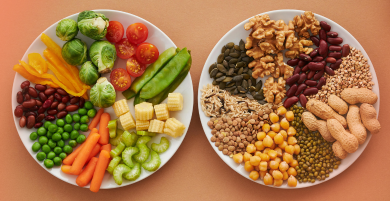Living with PCOS (Polycystic Ovary Syndrome) can feel exhausting. From irregular menstrual cycles and hormonal imbalances to unexpected weight gain and fatigue, the symptoms can disrupt everyday life. While there's no one-size-fits-all cure, one of the most powerful tools for managing PCOS is right on your plate– your diet.
A balanced diet doesn't just fuel your body– it plays a direct role in hormone regulation, metabolism, and mood. In this blog, we explore why nutrition is a game-changer in PCOS management and how to make your meals work for your hormones.
What Is PCOS?
PCOS is a hormonal disorder that affects the ovaries and often leads to irregular or absent ovulation. It's one of the most common causes of infertility and is linked to elevated levels of androgens (male hormones), insulin resistance, and in some cases, ovarian cysts. While the symptoms vary, many women with PCOS experience irregular periods, acne, hair growth on the face or body, and difficulty managing their weight.
What’s less talked about is that diet and lifestyle choices can significantly influence these symptoms– making food a first-line support in any PCOS treatment plan.
The Role Of Food In PCOS Management
There’s no one-size-fits-all “PCOS diet,” but a well-balanced, anti-inflammatory, and insulin-supportive way of eating can significantly reduce symptoms and improve overall hormonal health.
Here’s how food can support you:
1. Regulates Hormones And Insulin Levels
PCOS is closely linked to insulin resistance, which triggers elevated androgen levels– the root cause of many PCOS symptoms like acne, hair growth, and irregular cycles.
Choosing low-glycaemic, high-fibre foods helps stabilise blood sugar, regulate insulin, and reduce androgen production over time.
Focus on:
- Whole grains: oats, millets, quinoa, barley
- Non-starchy vegetables: spinach, broccoli, zucchini
- Lean proteins: eggs, fish, paneer, tofu, legumes
- Healthy fats: olive oil, walnuts, flaxseeds, avocado
2. Improves Menstrual Cycle Regularity
PCOS often disrupts ovulation, leading to missed or delayed periods. Nutrients like omega-3s, vitamin D, magnesium, and B-vitamins can help restore regular menstrual cycles and support reproductive health.
Eat more of:
- Omega-3s: fatty fish, flaxseeds, walnuts
- Vitamin D: fortified dairy, egg yolks, sun exposure
- Magnesium: pumpkin seeds, almonds, leafy greens
- B-vitamins: whole grains, eggs, dairy, nutritional yeast
3. Reduces Chronic Inflammation
Low-grade inflammation is common in PCOS and is associated with higher androgen levels and metabolic dysfunction. Anti-inflammatory foods rich in antioxidants and plant compounds can help ease this internal stress.
Add to your plate:
- Spices: turmeric, ginger
- Beverages: green tea, tulsi water
- Colourful fruits and vegetables: berries, beets, bell peppers
- Omega-3-rich sources: chia seeds, flax, fatty fish
4. Supports Healthy Weight Loss Or Maintenance
Weight gain is a common concern in PCOS, but crash diets often backfire. Instead, focus on slow-digesting carbs, protein, and fibre to regulate appetite and support your metabolism naturally.
Smart swaps:
- Replace refined grains with millets, quinoa, or brown rice
- Snack on roasted makhana or hummus with veggies
- Include protein with every meal to stay full longer
- Cook with healthy fats like mustard oil or olive oil instead of refined oils
5. Boosts Mood, Energy, And Stress Resilience
Mood swings, fatigue, and anxiety can stem from blood sugar fluctuations and hormonal shifts. A steady intake of nourishing food can improve energy levels, support neurotransmitter function, and aid in stress management.
Balance meals with:
- Protein + complex carbs + healthy fat combos
- Iron-rich foods (like spinach, dates) to avoid fatigue
- Hydration and magnesium-rich foods to reduce anxiety and improve sleep
6. Supports Hormonal Detox Through Gut And Liver Health
Your liver and gut help process and clear out excess hormones like estrogen and androgens. Supporting these systems helps reduce hormonal congestion and promotes clearer cycles and skin.
Support detox with:
- Probiotics: curd, fermented vegetables, kombucha
- Fibre: apples, leafy greens, oats
- Hydration: aim for 2–3 litres of water daily
- Herbal support: jeera water, dandelion tea, triphala
Foods To Limit Or Avoid
You don’t need to follow a restrictive plan, but cutting back on certain foods can significantly ease PCOS symptoms and improve hormone function.
Try To Limit:
- Refined sugars: sweets, bakery items, sugary drinks
- Trans fats: deep-fried food, margarine, packaged junk
- Highly processed foods: with preservatives and low nutrition
- High-GI carbs: white bread, white rice, instant noodles
- Excess dairy: some may experience acne or bloating (track your reaction)
Balance Is Key
Managing PCOS goes beyond prescriptions– it starts with everyday choices. A balanced diet can be your most effective ally in reducing symptoms, regulating menstrual cycles, and maintaining a healthy weight. Pair this with regular physical activity, good sleep, and stress management techniques for even greater impact.
Remember, consistency beats perfection. You don’t need a perfect diet– just a thoughtful, nourishing one.
If you’re unsure where to begin, consult a registered dietitian who understands hormonal health and can tailor a plan to your needs. With the right food, you're not just managing PCOS– you're empowering your body, cycle by cycle.


































































